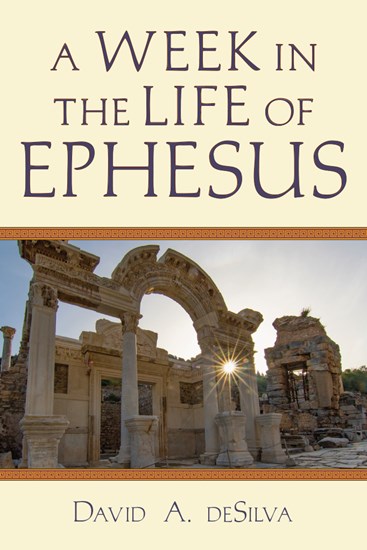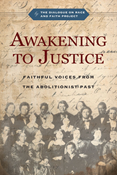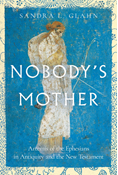
|
A Week in the Life of Ephesus
paperback
|
- Length: 176 pages
- Dimensions: 5.5 × 8.25 in
- Published: June 09, 2020
- Imprint: IVP Academic
- Item Code: 2485
- ISBN: 9780830824854
-
Other Retailers:
Amazon*
*affiliate partner
How should Christians live in an age of empire?
As the city of Ephesus prepares for a religious festival in honor of the emperor Domitian, a Christian landowner feels increasing pressure from the city's leaders to participate. Can he perform his civic duties and remain faithful to his Lord? Or has the time come for a costly choice?
In this historical novel, biblical scholar David deSilva brings to life such compelling struggles faced by the early Christians. Their insistence on the absolute lordship of their own singular deity brought them into conflict not only with the myriad religious cults of the day, but with all the crushing power of the empire itself. Meticulously researched and supplemented by historical images and explanatory sidebars, A Week in the Life of Ephesus poses anew the timeless question of Christianity and empire. Here is a vividly imaginative portrait of the Roman empire in all its beauty and might—and hanging over it, the looming sky of apocalypse.
"David deSilva's novel about a week in the life of Christians in Ephesus, living under the shadow of the Roman Empire, is a thrilling story as well as an educational journey through the ancient world. Set against the backdrop of the book of Revelation, this is not a novel that will leave you worried about being 'left behind,' but it will make a deep impression on how to be a faithful Christian against the backdrop of malevolent imperial power. . . . Could not put it down!"
"A Week in the Life of Ephesus brings alive the ancient Roman world of religious ritual, daily business, and family loyalties. The Christian's perennial challenge to follow after God and not money or fame takes shape under deSilva's skillful hand as first-century Ephesians live out their faith (or not) in the thoroughly pagan city. DeSilva weaves together characters, plot, and historical context, drawing the reader into the story. This is a must-read for those who want a deeper understanding of the ordinary reality of early Christians' lives."
"Ephesus was one of the leading centers of Christianity in the ancient world, and David deSilva invites us to picture it through this imaginative recreation of first-century life. He is well known for his scholarship on Revelation, which addressed churches in Ephesus and other cities in the region. By weaving ancient source materials into his narrative and offering commentary along the way, he links the fictional story to the social world and archaeological remains of Ephesus. This is a resource for those who want a glimpse into the dilemmas faced by Jesus' followers in a complex urban environment."
"Prepare to be transported to the ancient city of Ephesus! David deSilva writes with a deft hand, proving that he is a gifted storyteller and cultural historian. Spend this week in Ephesus and you will read the New Testament with fresh eyes."
"Using historical time travel brilliantly, deSilva incarnates the Christian community in Ephesus in the late first century AD. The challenges faced by believers—Christ versus Caesar, economic participation or marginalization, eating idol meat or abstaining—are effectively portrayed by characters known from texts and inscriptions. The reader feels the struggles of brothers and sisters trying to obey God as a fledgling minority while living in this political, commercial, and religious metropolis."
"Students and scholars have already enjoyed the meticulous historiography, sensitive literary analysis, imaginative flair, and theological depth of David DeSilva's previous writings, which range in genre from novel to New Testament introduction. In this volume, A Week in the Life of Ephesus, he conjoins these manifest strengths, taking the reader on an intriguing expedition to that ancient city in a crucial week of September in 89 CE. Through the eyes of ancient Christians in Ephesus, portrayed vividly in all their psychological and relational complexity, we come face-to-face with the perennial temptation to accommodate idolatry, with its attending commercial and political implications. DeSilva's compelling and suspenseful narrative of persons, families, and various strata of society is enhanced by helpful historical and cultural information offered in sidebars."
"What a great book! What was it like to be a Christian in the city of Ephesus in AD 89? How did Christians respond to the challenges posed by life in this large Greco-Roman city with its gods and temples, markets and gymnasia? In this fictional narrative, David DeSilva helps us to enter into the world of believers in Jesus and to see their struggles and joys, their challenges and hopes. We see how various Christian groups responded differently to the pressures they faced, and in the process we come to understand the book of Revelation more deeply. You'll not want to put this book down!"
"I often tell my students that one of our goals in New Testament courses is to develop our historical imaginations. Those accustomed to viewing faith and religion as a private sphere often struggle to imagine their way into the first-century world, where religion was deeply entwined with governmental structures and the corporate well-being of both city and empire. DeSilva's story narrates compellingly the very real pressure that early followers of Jesus would have experienced as many of their contemporaries viewed them as threats to the social order; if they refused to honor the gods, including the deified emperors, their reputations, finances, and even lives were at stake. Again and again in this story I asked myself, What would I have done?"
"Drawing on his vast knowledge of the urban centers of Rome's empire and the all-powerful Roman religiopolitical machine, David deSilva vividly brings the world of Roman Ephesus to life. Readers are quickly and easily drawn into the material world of Ephesus, including its markets, harbor, neighborhoods, and grand temples, but they are also immersed in Ephesian religious fervor and piety. And it is in this world of religious fervor and piety the readers come not only to understand but also feel the immense pressure on Ephesian Christians to compromise their worship of the one creator God. DeSilva creatively casts this crisis of Christian faith as the setting for the book of Revelation. This superb piece of historical fiction will serve as a valuable asset for introducing students and laity to the urban world of first-century Christians and more specifically the world of the seven churches of John's Apocalypse."
CONTENTS
Preface
Characters in the Drama
1 New Year's Day (1 Kaisaros, 9 Kalends October)
The Divine Artemis Sends Birthday Wishes
Musical Instruments in the Roman Period
Roman Asia's Calendar
A Symposium in the Prytaneion
The Title Neōkoros
2 Roman Piety, Roman Peace (2 Kaisaros, 8 Kalends October)
In Serapion's Town House
The Harbor of Ephesus
Titus Flavius Zeuxis
The Jewish Community of Ephesus
The City Fathers Convene
The Third Horseman and Domitians Edict
The Staff of the Imperial Cult
3 In the Shadow of the Gods (3 Kaisaros, 7 Kalends October)
Asia's Shared Temple of the Augusti in Ephesus
Civic Pride and Imperial Cult
In the Shade of the Basilica Stoa
In the Merchants' Quarter
Aelius Aristides on the Roman Imperial Economy
4 The Lord's Day (4 Kaisaros, 6 Kalends October)
Morning Orisons
Christian Worship at the Turn of the First Century
In the Great Theater
Imperial Cult in the Games of Neapolis
The Assembly in Amyntas's House
The Varieties of Christianity in Ephesus
5 The Crucible of Faith (5 Kaisaros, 5 Kalends October)
In Serapion's Town House
In the Gymnasium
Prochorus Arrives
John's Removal to Patmos
6 The Day of Decision (6 Kaisaros, 4 Kalends October)
The View from Above
Domitian's Diminished Popularity and Ephesus's Flavian Temple
In the Council Chamber
The Fiscus Iudaicus and the "Synagogue of Satan"
7 The Day After (7 Kaisaros, 3 Kalends October)
Business as Usual
A Grace Defaced
For Further Study













